Black Friday (18 November 1910)
In January 1910, H. H. Asquith called a general election in order to obtain a new mandate. However, the Liberals lost votes and was forced to rely on the support of the 42 Labour Party MPs to govern. Henry Brailsford, a member of the Men's League For Women's Suffrage wrote to Millicent Fawcett, the leader of the National Union of Woman's Suffrage Societies (NUWSS), suggesting that he should attempt to establish a Conciliation Committee for Women's Suffrage. "My idea is that it should undertake the necessary diplomatic work of promoting an early settlement". (1)
Emmeline Pankhurst, the leader of the Women's Social and Political Union (WSPU) agreed to the idea and they declared a truce in which all militant activities would cease until the fate of the Conciliation Bill was clear. A Conciliation Committee, composed of 36 MPs (25 Liberals, 17 Conservatives, 6 Labour and 6 Irish Nationalists) all in favour of some sort of women's enfranchisement, was formed and drafted a Bill which would have enfranchised only a million women but which would, they hoped, gain the support of all but the most dedicated anti-suffragists. (2) Fawcett wrote that "personally many suffragists would prefer a less restricted measure, but the immense importance and gain to our movement is getting the most effective of all the existing franchises thrown upon to woman cannot be exaggerated." (3)
The Conciliation Bill was designed to conciliate the suffragist movement by giving a limited number of women the vote, according to their property holdings and marital status. After a two-day debate in July 1910, the Conciliation Bill was carried by 109 votes and it was agreed to send it away to be amended by a House of Commons committee. However, when Keir Hardie, the leader of the Labour Party, requested two hours to discuss the Conciliation Bill, H. H. Asquith made it clear that he intended to shelve it. (4)
Emmeline Pankhurst was furious at what she saw as Asquith's betrayal and on 18th November, 1910, arranged to lead 300 women from a pre-arranged meeting at the Caxton Hall to the House of Commons. Pankhurst and a small group of WSPU members, including Dorinda Neligan, Elizabeth Garrett Anderson, Louisa Garrett Anderson, Sophia Duleep Singh and Anne Cobden Sanderson were allowed into the building but Asquith refused to see them. Women, in "detachments of twelve" marched forward but were attacked by the police. (5)
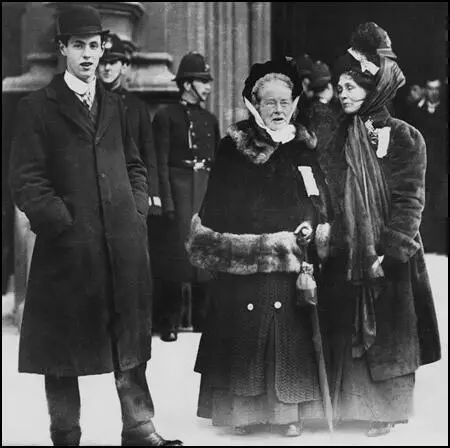
Votes for Women reported that 159 women and three men were arrested during this demonstration. (6) This included Ada Wright, Catherine Marshall, Eveline Haverfield, Anne Cobden Sanderson, Mary Leigh, Vera Holme, Louisa Garrett Anderson, Kitty Marion, Gladys Evans, Cecilia Wolseley Haig, Maud Arncliffe Sennett, Clara Giveen, Eileen Casey, Patricia Woodcock, Vera Wentworth, Winifred Mayo, Mary Clarke, Florence Canning, Henria Williams, Lilian Dove-Wilcox, Minnie Turner, Bertha Brewster, Charlotte Haig, Lucy Burns and Grace Roe. (7)
Sylvia Pankhurst later described what happened on what became known as Black Friday: "As, one after the other, small deputations of twelve women appeared in sight they were set upon by the police and hurled aside. Mrs Cobden Sanderson, who had been in the first deputation, was rudely seized and pressed against the wall by the police, who held her there by both arms for a considerable time, sneering and jeering at her meanwhile.... Just as this had been done, I saw Miss Ada Wright close to the entrance. Several police seized her, lifted her from the ground and flung her back into the crowd. A moment afterwards she appeared again, and I saw her running as fast as she could towards the House of Commons. A policeman struck her with all his force and she fell to the ground. For a moment there was a group of struggling men round the place where she lay, then she rose up, only to be flung down again immediately. Then a tall, grey-headed man with a silk hat was seen fighting to protect her; but three or four police seized hold of him and bundled him away. Then again, I saw Miss Ada Wright's tall, grey-clad figure, but over and over again she was flung to the ground, how often I cannot say. It was a painful and degrading sight. At last, she was lying against the wall of the House of Lords, close to the Strangers' Entrance, and a number of women, with pale and distressed faces were kneeling down round her. She was in a state of collapse." (8)
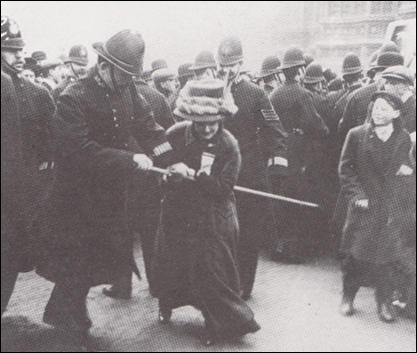
Several women reported that the police dragged women down the side streets. "We knew this always meant greater ill-usage.... The police snatched the flags, tore them to shreds, and smashed the sticks, struck the women with fists and knees, knocked them down, some even kicked them, then dragged them up, carried them a few paces and flung them into the crowd of sightseers." (9)
The photograph of Ada Wright on the front page of The Daily Mirror the next day caused a great deal of embarrassment to the Home Office and the government demanded that the negative be destroyed. (10) Wright told a reporter that she had been at seven suffragette demonstrations, but had "never known the police so violent." (11) Charles Mansell-Moullin, who had helped treat the wounded claimed that the police had used "organised bands of well-dressed roughs who charged backwards and forwards through the deputations like a football team without any attempt being made to stop them by the police." (12)
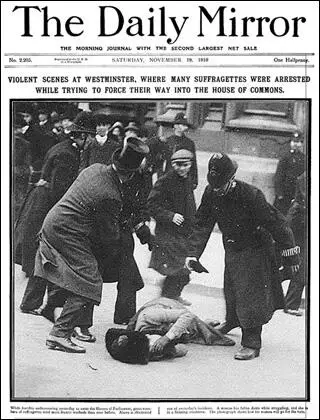
Sylvia Pankhurst believed that Winston Churchill, the Home Secretary, had encouraged this show of force. "Never, in all the attempts which we have made to carry our deputations to the Prime Minister, have I seen so much bravery on the part of the women and so much violent brutality on the part of the policeman in uniform and some men in plain clothes. It was at the same time a gallant and a heart-breaking sight to see those little deputations battling against overwhelming odds, and then to see them torn asunder and scattered, bruised and battered, against the organized gangs of rowdies. Happily, there were many true-hearted men in the crowd who tried to help the women, and who raised their hats and cheered them as they fought. I found out during the evening that the picked men of the A Division, who had always hitherto been called out on such occasions, were this time only on duty close to the House of Commons and at the police station, and that those with whom the women chiefly came into contact had been especially brought in from the outlying districts. During our conflicts with the A Division they had gradually come to know us, and to understand our aims and objects, and for that reason, whilst obeying their orders, they came to treat the women, as far as possible, with courtesy and consideration. But these men with whom we had to deal on Friday were ignorant and ill-mannered, and of an entirely different type. They had nothing of the correct official manner, and were to be seen laughing and jeering at the women whom they maltreated." (13)
Churchill had been a long-term opponent of votes for women. As a young man he argued: "I shall unswervingly oppose this ridiculous movement (to give women the vote)... Once you give votes to the vast numbers of women who form the majority of the community, all power passes to their hands." His wife, Clementine Churchill, was a supporter of votes for women and after marriage he did become more sympathetic but was not convinced that women needed the vote. When a reference was made at a dinner party to the action of certain suffragettes in chaining themselves to railings and swearing to stay there until they got the vote, Churchill's reply was: "I might as well chain myself to St Thomas's Hospital and say I would not move till I had had a baby." However, it was the policy of the Liberal Party to give women the vote and so he could not express these opinions in public. (14)
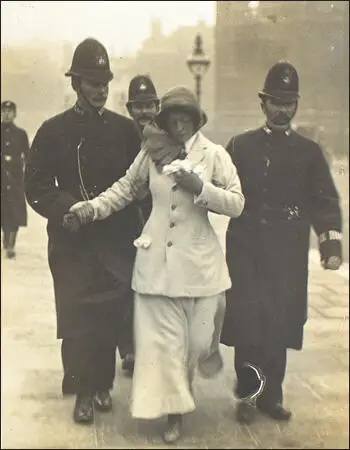
Henry Noel Brailsford wrote in Votes for Women: "Four witnesses described the barbarous usage to which another woman, Miss H. was subjected. After she had been flung to the ground, shaken and pushed, and had her arms and wrists twisted, she explained, "Help me to the railings". While trying to recover her breath, a policeman seized her head, and rubbed her face against the iron railings. To illustrate the recklessness with which the police seized women (usually by the throat) and flung them backwards to the ground, we would draw attention to two separate cases in which a woman was flung almost under the wheels of a passing motor car. The intention of terrorising and intimidating the women was carried by many of the police beyond mere violence. Twenty-nine of these statements complain of more or less aggravated acts of indecency Women describe such treatment only with the greatest reluctance, and though the volume of evidence under this head is a considerable, there are other instances which we are not permitted to cite." (15)
Henria Williams was one of the women who was beaten by the police. She wrote to her friend, Dr. Jessie Murray about what happened. "I should first mention that I have a weak heart, and have not the physical power or breath to resist as my wish or spirit would will or like. Therefore, what may not seem extraordinary to some women or people was very much so for me. The police have such strong, large hands, that when they take hold of one by the throat, as I saw one man do - but not to me - or grab one's sides or ribs, which was done to me, they cannot possibly know how terribly at times they are hurting. One policeman after knocking me about for a considerable time, finally took hold of me with his great strong hand like iron just over my heart. He hurt me so much that at first I had not the voice power to tell him what he was doing. But I knew that unless I made a strong effort to do so he would kill me. So collecting all the power of my being, I commanded him to take his hand off my heart. Yet that policeman would not arrest me and he was the third or fourth who had knocked me about. The two first after pinching my arms, kicking my feet, and squeezing and hurting me in different ways, made me think that at last they had arrested me, but they each one only finally took me to the edge of the thick crowd, and then without mercy forced me into the midst of it, and with the crowd pushing in the opposite direction for a few minutes I doubted if I could keep my consciousness, and my breath had gone long before they finally left me in the crowd… Finally, I was so exhausted that I could not go out again with the last batch that same evening. Although I had no limbs broken, still my arms, sides, and ankles were sore for days afterwards. But that was not so bad as the inward shaking and exhaustion I felt." (16)
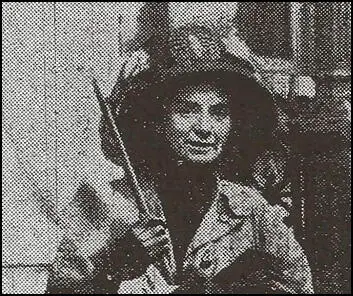
Frank Whitty, a gentleman's outfitter from Sidcup, tried to rescue Henria Williams from the police: "I saw... sights that made me feel ashamed of my country; one of the cruelest cases was that of a brave lady... in a semi-fainting condition, so much so that she could hardly stand. Time after time, with a courage that should have shamed the police into doing their obvious duty and arresting her, she attempted to get through the cordon. I went to her side to do what I could to help and uphold her in her brave but hopeless struggle. At first I tried to persuade her to leave the crowd but .. realised her determination to "do or die" ... All I could do was to try and help her to the best of my power and to ward off the blows, kicks and insults as I could from her fainting body ... Time after time we were forced back into the crowd by the police with an amount of violence and brutality entirely unnecessary. On these occasions I had to put my arm around her to keep her from falling under the feet of the horses, or worse still, under the crowd.". (17)
However, the daily newspapers presented a different view picture of the event. The Daily Mail reported that it was the women who were aggressive against the police. "The police at one time were almost overcome… The women hurled themselves on the thin line of police so fiercely that they were pushed back inch by inch." (18) The Daily Chronicle made a similar point: "These scenes, exceeding in violence anything yet attempted by the members of the Militant Women's Social and Political Union, followed on a meeting at Caxton Hall. The women at once tried to force the police cordon, and with the press of hundreds that soon gave way." (19) The Daily Express claimed that the women used violence against the men. "By sheer weight of numbers the women began to force back the double cordon of police reinforcements were drafted from Cannon Row, but the opposing numbers were still too strong. The cordon was weakened by the attempts made by some of the bolder women to grapple with individual policeman." (20)
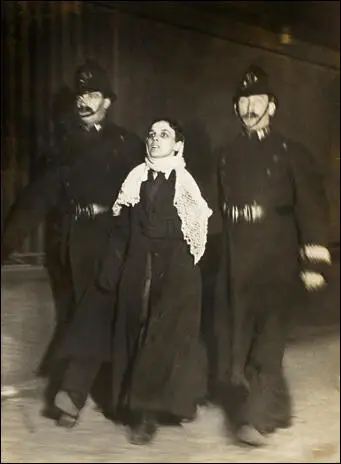
Henry Brailsford was commissioned to write a report Treatment of the Women's Deputations of November 18th, 22nd and 23rd, 1910, by the Police (1910) on Black Friday. He took testimony from a large number of women, including Mary Frances Earl: "In the struggle the police were most brutal and indecent. They deliberately tore my undergarments, using the most foul language - such language as I could not repeat. They seized me by the hair and forced me up the steps on my knees, refusing to allow me to regain my footing... The police, I understand, were brought specially from Whitechapel." Bertha Brewster commented that "both arms were very much bruised for over three weeks… I could hardly walk upstairs… the Blackheath policemen were dreadfully rough and cruel… and lifted me right up and flung me as hard as they could many times." (21)
Paul Foot, the author of The Vote (2005) has pointed out, Brailsford and his committee obtained "enough irrefutable testimony not just of brutality by the police but also of indecent assault - now becoming a common practice among police officers - to shock many newspaper editors, and the report was published widely". (22) However, Edward Henry, the Commissioner of the Metropolitan Police, claimed that the sexual assaults were committed by members of the public: "Amongst this crowd were many undesirable and reckless persons quite capable of indulging in gross conduct." (23)
Henria Williams died on 2nd January 1911. Her brother wrote: "She died while actively engaged in furthering the cause which you have so deep at heart. From our long conversations and correspondence, it is beyond doubt that my sister was fully aware that she was affliction of the heart and the work she was doing was exceedingly dangerous. Nevertheless, she willingly and zealously persisted in doing whatever she could, and on several occasions expressed herself as quite prepared to make the sacrifice of some years of her natural life." (24)
Cecilia Wolseley Haig was also assaulted by the police on Black Friday. She died on 31st November 1911. (25) Sylvia Pankhurst claimed that both women died because of the beatings they received from the police. "Henria Williams, already suffering from a weak heart, did not recover from the treatment she received that night in the Square, and died on January 1st.... I saw Celilia Haig go out with the rest; a tall, strongly built, reserved woman, comfortably situated, who in ordinary circumstances might have gone through life without receiving an insult, much less a blow. She was assaulted with violence and indecency, and died in December 1911, after a painful illness, arising from her injuries." (26)
Primary Sources
(1) Paul Foot, The Vote (2005)
Henry Brailsford started from the undeniable fact that the vast majority of Members of Parliament, even after the 1910 elections, favoured votes for women in some measure. Surely, he reflected, a deal could be arranged so that majority could be converted into enfranchising legislation. Tirelessly, he put together what became known as the Conciliation Committee, composed of 36 MPs all in favour of some sort of women's enfranchisement. The Committee cobbled together a Conciliation Bill that would grant the vote to some women. Emmeline and Christabel Pankhurst and the Pethick-Lawrences were suspicious of the new Bill but did not oppose it. Reluctantly, they agreed a temporary truce in which all militant activities, including by election campaigning against Liberal candidates, would cease until the fate of the Conciliation Bill was clear.
The Pankhursts' suspicions were firmly based. The Bill was infected by the rotten compromises that had dogged so many similar measures in the past. Under its provisions, married women were barred from voting in the same constituency as their husbands. Lodgers, too, had no vote - a restriction that especially shocked Emmeline Pankhurst. Far too many concessions, she complained, were made to the Tories on the Committee, all of whom were terrified by the spectre of universal suffrage. Nevertheless, the truce held. After a two-day debate in July 1910, the Bill was carried by 109 votes, and immediately sent to a committee of the whole House, thus ensuring that at least until the second general election of 1910 it was doomed. Studying the division lists, Brailsford and his colleagues were surprised to see the name of Rt. Hon. Winston Churchill, Home Secretary, as an opponent. Churchill had given an assurance to the Conciliation Committee that he would support the Bill, and had even allowed his name to be published as a supporter. Brailsford had the first clear sign of the duplicity of the Liberal politicians with whom he was dealing.
In November 1910, in protest at the failure of the first Conciliation Bill, Emmeline Pankhurst convened a huge meeting and enjoined the audience to "come with me to the House of Commons". Hundreds of women followed her. It looked as though the truce was at an end, but the brutality of the police that evening was disgusting enough to swing the pendulum of public opinion towards the protesters. Brailsford himself took charge of the collection of evidence from the demonstrators. His report contained enough irrefutable testimony not just of brutality by the police but also of indecent assault - now becoming a common practice among police officers - to shock many newspaper editors, and the report was published widely. Its impact went way beyond the bounds of the Woman's Press, which had commissioned it. The report, and the new Liberal Government that took office after the election of December 1910, also bought more time for the WSPU truce on militancy. The truce held while a new Conciliation Bill was published without the £10 property qualification for voting that had been in the first Bill, and without an express ban on husbands and wives voting together. In a sudden surge of public and parliamentary enthusiasm, the second reading of this Bill passed the Commons on 5 May 1911 with a majority of 167, and for a brief moment it seemed to Brailsford, Nevinson and company that their prodigious negotiations had been worthwhile:
They were reckoning without top Liberal politicians, in particular the Chancellor of the Exchequer, David Lloyd George. Lloyd George loved high office. He was not remotely interested in votes for women, and he regarded the campaigners, especially the militant ones, as an infernal nuisance. On the other hand, he understood that the Conciliation Committee posed a problem for the Government. A Commons majority of 167 could hardly be ignored, especially when the Bill had been passed two years running. But Lloyd George was convinced that the chief effect of the Bill, if it became law, would be to hand more votes to the Tory Party. The problem called for what Lloyd George would have described as diplomacy, but quickly turned out to be duplicity. After stalling the WSPU all through the summer, Lloyd George started secret discussions with Brailsford and the Conciliation Committee. On 7 November 1911, he told the Committee he would support the Conciliation Bill if another Bill to introduce manhood suffrage failed. No such Bill had even been suggested, but, as if by magic, the following day Prime Minister Asquith announced that in the next session of Parliament he would introduce a Bill to enfranchise most men - a Bill that, he promised, could be amended to include women.
(2) Robert Lloyd George, David & Winston: How a Friendship Changed History (2005)
Churchill and Lloyd George had radically different attitudes towards women and these coloured their approach to demands for suffrage. Churchill's may be characterised as Victorian: perhaps because of his parents' unconventional private lives, he reacted by becoming, if not prudish, at least reserved with young women. He showed a healthy romantic interest in music-hall actresses, and later in Pamela Plowden, among other young ladies, but did not enter into a full relationship until, at the age of thirty-four, he married Clementine Hozier. Lloyd George, on the other hand, had an active sex life in Criccieth and later in London. This reflected the difference between the "natural" approach of growing up in the Welsh countryside and the artificial environment of an all-male public school and the Army.
Churchill's attitude to women was one of old-fashioned chivalry... In the eyes of the young Winston, woman was on a pedestal.
During his military service in India, Churchill commented on the parliamentary debate on women's suffrage; which he studied in the Annual Register.... "I shall unswervingly oppose this ridiculous movement (to give women the vote)... Once you give votes to the vast numbers of women who form the majority of the community, all power passes to their hands." It was a reactionary sentiment fully in accord with those of his fellow cavalry officers in the Raj.
Even a decade later, in 1906, after he had joined the Liberal Party and begun to absorb and express fairly radical opinions about reform, Churchill still responded to his constituents in Manchester (a staunchly Liberal area) on the matter: "I am not going to be hen-pecked (thus coining the word) on a question of such grave importance." And instead of dealing with the demands of the suffragettes who disrupted his political meetings, he avoided the question by saying, "We must observe courtesy and chivalry to the weaker sex."
When a reference was made at a dinner party to the action of certain suffragettes in chaining themselves to railings and swearing to stay there until they got the vote, Churchill's reply was: "I might as well chain myself to St Thomas's Hospital and say I would not move till I had had a baby."
Nevertheless, it is noticeable that after his marriage to Clementine, his view of women began to change. He became more liberal and more worldly. His colleagues in the Liberal Cabinet, however, continued to tease him that his carefully prepared speeches were often interrupted by "What about votes for women, Mr Churchill?"
(3) The Daily Mail (19 November 1910)
The police at one time were almost overcome… The women hurled themselves on the thin line of police so fiercely that they were pushed back inch by inch.
(4) The Daily Chronicle (19 November 1910)
These scenes, exceeding in violence anything yet attempted by the members of the Militant Women's Social and Political Union, followed on a meeting at Caxton Hall. The women at once tried to force the police cordon, and with the press of hundreds that soon gave way.
(5) The Daily Express (19 November 1910)
By sheer weight of numbers the women began to force back the double cordon of police reinforcements were drafted from Cannon Row, but the opposing numbers were still too strong. The cordon was weakened by the attempts made by some of the bolder women to grapple with individual policeman.
(6) Henria Williams, letter to Dr. Jessie Murray (27th December, 1910)
I should first mention that I have a weak heart, and have not the physical power or breath to resist as my wish or spirit would will or like. Therefore, what may not seem extraordinary to some women or people was very much so for me. The police have such strong, large hands, that when they take hold of one by the throat, as I saw one man do - but not to me - or grab one's sides or ribs, which was done to me, they cannot possibly know how terribly at times they are hurting.
One policeman after knocking me about for a considerable time, finally took hold of me with his great strong hand like iron just over my heart. He hurt me so much that at first I had not the voice power to tell him what he was doing. But I knew that unless I made a strong effort to do so he would kill me. So collecting all the power of my being, I commanded him to take his hand off my heart. Yet that policeman would not arrest me and he was the third or fourth who had knocked me about. The two first after pinching my arms, kicking my feet, and squeezing and hurting me in different ways, made me think that at last they had arrested me, but they each one only finally took me to the edge of the thick crowd, and then without mercy forced me into the midst of it, and with the crowd pushing in the opposite direction for a few minutes I doubted if I could keep my consciousness, and my breath had gone long before they finally left me in the crowd… Finally, I was so exhausted that I could not go out again with the last batch that same evening. Although I had no limbs broken, still my arms, sides, and ankles were sore for days afterwards. But that was not so bad as the inward shaking and exhaustion I felt.
One gentleman on the first day rescued me three times. After the third time, he said to the policeman, who happened to be the same one each time, "Are you going to arrest this lady, or are you going to kill her?" But he did not arrest me, but he actually left me alone for some time after that."
(7) Frank Whitty, Votes for Women (25th November 1910)
I saw... sights that made me feel ashamed of my country; one of the cruelest cases was that of a brave lady... in a semi-fainting condition, so much so that she could hardly stand. Time after time, with a courage that should have shamed the police into doing their obvious duty and arresting her, she attempted to get through the cordon. I went to her side to do what I could to help and uphold her in her brave but hopeless struggle. At first I tried to persuade her to leave the crowd but .. realised her determination to "do or die" ... All I could do was to try and help her to the best of my power and to ward off the blows, kicks and insults as I could from her fainting body ... Time after time we were forced back into the crowd by the police with an amount of violence and brutality entirely unnecessary. On these occasions I had to put my arm around her to keep her from falling under the feet of the horses, or worse still, under the crowd.
Mrs Emily Duval, Evelyn Huddestone, Sarah Carwin, Bertha Ryland, Olive Wharry, Isabella Potbury, Kitty Marion and Jeanette Green.
(8) Sylvia Pankhurst, Votes for Women (25th November 1910)
As, one after the other, small deputations of twelve women appeared in sight they were set upon by the police and hurled aside. Mrs Cobden Sanderson, who had been in the first deputation, was rudely seized and pressed against the wall by the police, who held her there by both arms for a considerable time, sneering and jeering at her meanwhile.
At first the crowds had pressed up close to the House in all directions, but after a fierce struggle the police drove them back and drew up their cordons so as to keep a clear space from the corner of Palace Yard to the Strangers' Entrance.
Just as this had been done, I saw Miss Ada Wright close to the entrance. Several police seized her, lifted her from the ground and flung her back into the crowd. A moment afterwards she appeared again, and I saw her running as fast as she could towards the House of Commons. A policeman struck her with all his force and she fell to the ground. For a moment there was a group of struggling men round the place where she lay, then she rose up, only to be flung down again immediately. Then a tall, grey-headed man with a silk hat was seen fighting to protect her; but three or four police seized hold of him and bundled him away. Then again, I saw Miss Ada Wright's tall, grey-clad figure, but over and over again she was flung to the ground, how often I cannot say. It was a painful and degrading sight. At last, she was lying against the wall of the House of Lords, close to the Strangers' Entrance, and a number of women, with pale and distressed faces were kneeling down round her. She was in a state of collapse.
The same kind of treatment was meted out to other women. I saw one tall woman in a white coat hit about the head and knocked down several times. Close to where my car was standing two young girls with linked arms were being dragged about by two policemen, and a man in plain clothes came up and kicked one of them, whilst a number of others stood by and jeered.
Never, in all the attempts which we have made to carry our deputations to the Prime Minister, have I seen so much bravery on the part of the women and so much violent brutality on the part of the policeman in uniform and some men in plain clothes. It was at the same time a gallant and a heart-breaking sight to see those little deputations battling against overwhelming odds, and then to see them torn asunder and scattered, bruised and battered, against the organized gangs of rowdies. Happily, there were many true-hearted men in the crowd who tried to help the women, and who raised their hats and cheered them as they fought.
I found out during the evening that the picked men of the A Division, who had always hitherto been called out on such occasions, were this time only on duty close to the House of Commons and at the police station, and that those with whom the women chiefly came into contact had been especially brought in from the outlying districts. During our conflicts with the A Division they had gradually come to know us, and to understand our aims and objects, and for that reason, whilst obeying their orders, they came to treat the women, as far as possible, with courtesy and consideration. But these men with whom we had to deal on Friday were ignorant and ill-mannered, and of an entirely different type. They had nothing of the correct official manner, and were to be seen laughing and jeering at the women whom they maltreated.

